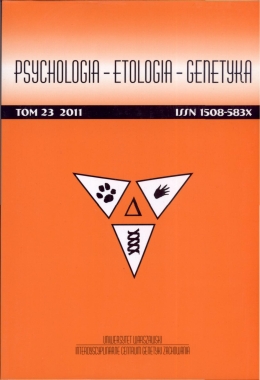Wzbudzanie emocji o genezie automatycznej bądź refleksyjnej a przejawy efektywności kontroli uwagi w Teście Antysakkad
Automatic vs. reflective emotions as moderators of cognitive control in the Antisaccade Task
Author(s): Kamil K. Imbir, Maria JarymowiczSubject(s): Psychology
Published by: Wydawnictwo Naukowe Scholar Sp. z o.o.
Keywords: emotion–cognition relationship; diffusive and holistic automatic emotions; the antisaccade tasks
Summary/Abstract: Studies on the emotion–cognition relationship often neglect a variety of emotions’ origin, due to different regulative consequences. The article is based on the taxonomy of emotions, distinguishing the automatic (homeostatic and hedonic) vs. reflective (due to cognitive self-standards and axiological concepts) emotions. This taxonomy is based on: 1) the Jeseph LeDoux’s neurobiological model of the low and high roads to amygdala, 2) the hypothesis of primary affects’ diffusiveness of Robert Zajonc (1980). It has been assumed that the diffusive and holistic automatic emotions (contrary to reflective emotions specifically connected with a particular stimulus) reduce ability to cognitive control and perceptual selectivity. The hypothesis predicted that manipulation of automatic emotions will lead to the lower level of performance of the antisaccade tasks than manipulation of the reflective emotions. In two studies (with participation of students of two Warsaw universities: study 1 – n = 100, study 2 – n = 80) participants were requested to read series of sentences related to a particular category of emotions (or neutral sentences) and then to perform the antisaccade tasks. In both studies the level of performance was lower in conditions of concentration on the automatic emotions than in neutral condition or the reflective emotions activation. Indicators of cognitive control were similar for negative vs. positive emotions.
Journal: Psychologia-Etologia-Genetyka
- Issue Year: 2011
- Issue No: 23
- Page Range: 9-28
- Page Count: 20
- Language: Polish
- Content File-PDF

